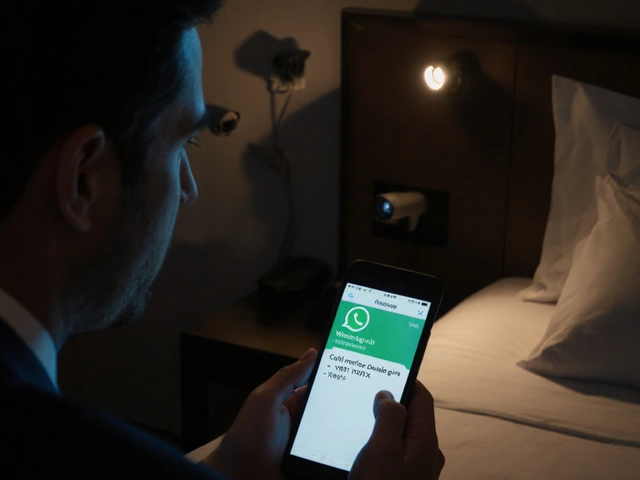If you landed here hoping for a list of names and numbers, you won’t find that. Dubai has strict laws around sex work, and the review space is a minefield of fakes, scams, and legal risk. What you will get is a clear, no-drama way to read reviews intelligently, avoid getting burned, and understand what’s legal-and what’s not-right now in 2025.
- TL;DR: Most review posts are unverifiable, many are planted or AI-written, and deposits are the number-one scam signal.
- Law first: Prostitution and brothel-keeping are illegal under UAE Federal Decree-Law No. 31 of 2021; online solicitation can fall under Federal Law No. 34 of 2021 (Cybercrime).
- Check sources: Forums with active moderation beat anonymous ads; always cross-reference names, photos, and dates.
- Safety rule: Never send a deposit; meet only in public, and never pressure hotel staff to bend guest rules.
- Alternatives: Licensed spas (non-sexual), mainstream nightlife, and social events are the safer routes for company.
How to read Dubai escort reviews without getting scammed (and without crossing the line)
Dubai isn’t like other party cities. The law is strict, and the online review ecosystem knows it-so it’s flooded with noise. If you’re scanning dubai escort reviews for “what’s real,” use this flow instead of trusting the first glowing post you see.
1) Start with the law, not the lure
Before you believe any review, remember the framework you’re operating in. Under UAE Federal Decree-Law No. 31 of 2021 (Penal Code), prostitution and facilitating it (including operating or profiting from it) are criminal offenses. Federal Law No. 34 of 2021 on Combating Rumors and Cybercrimes can also apply to online solicitation, advertising, or facilitating illegal acts via digital platforms. Dubai Police and the UAE Public Prosecution periodically warn about online romance/escort scams-these are not rare. Any review that pushes you toward illegal transactions is exposing you to real risk. That’s the baseline.
2) Read the review like an auditor
Don’t skim. Audit. Use this quick checklist every time:
- Dates: Is the review recent? A two-year-old post in Dubai might as well be fiction.
- Specifics vs fluff: Real experiences tend to mention neutral details (time windows, communication lag, venue policies) rather than repeated adjectives.
- Consistency: Does the reviewer history show balanced posts or just breathless praise for multiple “profiles” that look the same?
- Photo verification: Reverse image search across at least two engines. If the same photo appears in multiple countries or years apart, it’s likely recycled.
- Rates and deposits: Reviews normalizing deposits or prepaid “driver fees” are a red flag. Scammers love urgency + discount + deposit.
- Contact method: Pushy WhatsApp/Telegram pivots, especially from a fresh number with no history, are high-risk.
3) Cross-reference like a pro
One mention means nothing. Look for the same name, alias, or handle across at least two independent sources-ideally a moderated forum and a separate aggregator. Compare writing styles, timestamps, and small details (e.g., different heights or age claims across ads). If you see identical paragraphs repeated under different profiles, you’ve found template spam.
4) Know the hotel and ID reality
Many Dubai hotels require valid ID for every guest and may restrict unregistered visitors, especially late at night. Hotel policy is not a loophole; front-desk discretion varies, and staff won’t risk their license for a stranger. Any review bragging about “no ID needed anywhere” isn’t just misleading-it’s a risk magnet for you. For serviced apartments, expect CCTV, access cards, and management rules. Assume venues cooperate with authorities.
5) The deposit rule of thumb
If anyone asks for a deposit, gift card, crypto, or a “driver fee” before meeting in a public place, assume scam. Real-world companionship arrangements that stay within legal boundaries don’t need prepaid anything. Scammers thrive on FOMO. Your best defense is patience and public meeting points-if they push, you walk.
| Review Source | Verification Level | Common Red Flags | Pros | Cons | Risk Level (Low/Med/High) |
|---|---|---|---|---|---|
| Moderated forums (long-running) | Medium (peer scrutiny, timestamps) | New accounts hyping the same profile; vague praise without logistics | Community checks, mods remove obvious scams | Still anonymous; bad actors adapt fast | Medium |
| Aggregator sites / directories | Low-Medium (photo reuse common) | Stock-model photos; rates too tidy; copy-paste bios | Easy to browse; some basic filters | Pay-to-list incentives; minimal vetting | Medium-High |
| Social profiles (Insta, Snapchat) | Low (follower count can be bought) | New accounts; comments turned off; only glam shots | Direct messaging; story highlights can show recency | Impersonation and honeytraps are common | High |
| WhatsApp/Telegram groups | Very low (no independent audit) | Deposit demands; “agent” churn; pressure tactics | Fast responses | Scam-heavy; zero accountability | Very High |
| Personal blogs | Low (single voice) | Affiliate bias; no negative posts | Useful context when transparent | Cherry-picked; hard to validate | Medium |
6) What the law means for your browsing
Some quick, practical points:
- Illegal content is illegal to promote or facilitate, even online. That includes arranging paid sexual services, which fall under the Penal Code.
- Misuse of telecommunications or platforms to facilitate illegal acts may trigger cybercrime provisions.
- Hotels, bars, and spas operate under licenses; staff won’t risk violations. Expect ID checks and policies to be enforced.
Keep your actions boring: read, compare, and if in doubt-don’t act. Curiosity isn’t a crime; facilitation can be.

Decision criteria, red flags, and real-world scenarios
Not all review ecosystems are equal. If you must assess reputations at arm’s length, pin your decisions on neutral signals, not promises.
Core decision criteria to apply to any review
- Recency threshold: Treat anything older than 90 days as stale.
- Triangulation: You need at least two independent sources that align on basic facts.
- Identity stability: Same alias, same approximate details, consistent communication style.
- Policy awareness: Any review that claims to bypass hotel or ID rules is either naive or bait.
- Money flow: Zero deposits. No crypto “security.” No gift cards. No “driver fee.”
Specific red flags to stop on sight
- “Limited-time rate if you pay now” or “driver waiting downstairs-send fee first.”
- Profile photos that appear across multiple countries/years.
- Review accounts created in the last week posting multiple 5-star raves for different aliases.
- Messaging that moves platforms instantly and aggressively.
- Any request to bring controlled substances. That’s a hard no in the UAE, with severe penalties.
Scenarios and trade-offs
Because context matters, here’s how people often get tripped up-and safer pivots that keep you social without drama.
- Business traveler, one night only: High time pressure leads to deposit scams. Safer pivot: an early evening at a licensed hotel bar or lounge. Dubai’s hotel scene is social; no commitments, plenty of conversation.
- Tourist couple curious about “experiences”: Curiosity collides with the law fast. Safer pivot: book a luxury spa treatment at a licensed hotel, then dinner and live music. Keep it classy, keep it legal.
- Expat resident testing waters: Complacency grows over time. Safer pivot: join vetted social clubs, brunch groups, or mixed sports leagues. You’ll meet people in normal settings without legal headaches.
Best for / Not for (by review source)
- Moderated forums: Best for cross-checking claims. Not for actionable arrangements.
- Aggregators: Best for surface-level research. Not for trust or payments.
- Social media: Best for vibe-check only. Not for verification.
- Messaging groups: Best for seeing how scams operate. Not for anything else.

Safer alternatives, etiquette, mini‑FAQ, and your next steps
If what you really want is company, there are better ways to spend an evening in Dubai without stepping into legal quicksand. This isn’t moralizing; it’s practical.
Safer alternatives for a social night
- Licensed hotel bars and lounges: Dubai’s nightlife is built on upscale hospitality. Conversation comes easy, and the setting is clean and secure.
- Non-sexual, licensed spas: Book top-tier hotels for legit treatments. Great unwind, zero drama.
- Daytime social experiences: Desert safaris, yacht group trips, cooking classes. You meet people naturally, minus the risk.
- Dining and live music: Look for supper clubs and jazz nights in major hotels. You’ll have a story either way.
Etiquette that keeps you out of trouble
- Respect venue policies: If a hotel says “registered guests only,” that’s the end of it.
- Keep it public: Meet in visible spaces. If someone insists on a private apartment first, pass.
- No deposits, ever: Repeating it because it saves wallets every day.
- Mind your messages: Don’t put illegal requests in writing. Better yet, don’t make them at all.
- Stay sober enough to decide: Scams spike after midnight when judgment dips.
Mini‑FAQ
Is escorting legal in Dubai?
Prostitution and facilitating it are illegal under UAE Federal Decree-Law No. 31 of 2021. Online facilitation can also be prosecuted under Federal Law No. 34 of 2021.
Are Dubai escort reviews reliable?
Mostly not. Many are planted, recycled, or AI-generated. Treat them as noisy hints, not facts. Always cross-check and never prepay.
Can hotels allow visitors?
Policies vary, but expect ID checks and restrictions. Some hotels disallow unregistered overnight visitors. Staff won’t risk licenses for exceptions.
What’s the deal with deposits?
Deposits are the number-one scam lever. If someone demands money before meeting in public, walk away.
Are VPNs legal?
VPNs are not illegal by themselves in the UAE, but using them to commit or conceal illegal acts can lead to penalties. Always check current guidance from UAE authorities.
What are potential penalties?
Penalties can include fines and imprisonment for prostitution-related offenses and for cybercrime violations. For precise, current terms, consult the text of the relevant laws or legal counsel.
Decision tree: what’s your real goal?
- I want conversation and a relaxed evening → Try a licensed hotel lounge or supper club.
- I want to de-stress, not complications → Book a reputable, licensed spa at a major hotel.
- I want to meet new people organically → Join a group tour, yacht day, or social club event.
- I’m tempted by a “too good to be true” review → Stop. Cross-check sources. If a deposit appears, abort.
Next steps / Troubleshooting
If you’re a first-time visitor:
- Bookmark Dubai Police and UAE Public Prosecution channels for advisories.
- Plan evenings around reputable hotels with live music or lounges.
- Keep copies of your ID; expect checks at venues.
- Set a personal hard rule: no deposits, no private apartments.
If you’re a frequent business traveler:
- Create a short list of safe, licensed venues you like across neighborhoods.
- Schedule early dinners; leave before midnight to avoid late-night pressure and judgment dips.
- Use a separate email/notes app for trip details, not messaging platforms where scammers lurk.
If you’re a couple exploring the city:
- Pick shared experiences: tasting menus, boat trips, or spa-and-dine packages.
- Skip review rabbit holes; they add risk, not value, for couples.
- Talk boundaries before the night starts to avoid split-second decisions.
If you’ve already been scammed (deposit sent):
- Stop all contact. Do not chase or send more.
- Document everything (screenshots, numbers, timestamps).
- Report to your bank or payment provider. If appropriate, report to authorities.
- Audit your digital security: change passwords, check device permissions, and scan for malware.
If you’re unsure whether a review is legit:
- Reverse image search photos across at least two engines.
- Check reviewer history for balance and time gaps.
- Cross-reference the alias on a second, unrelated platform.
- If a deposit is mentioned anywhere, treat the entire thread as compromised.
Credibility notes (why you can trust the guidance)
- Legal baselines reference UAE Federal Decree-Law No. 31 of 2021 (Penal Code) and Federal Law No. 34 of 2021 (Cybercrime). These frame the risks tied to online facilitation.
- Practical hotel policy notes reflect Dubai’s licensed hospitality rules and routine ID checks at reputable properties.
- Scam patterns (deposits, image reuse, agent churn) match public advisories and common fraud patterns seen across GCC digital classifieds.
You don’t need a spreadsheet to stay safe-just a few non-negotiables: no deposits, public spaces, respect venue rules, and keep your plans legal. Read reviews like an auditor, not a shopper, and you’ll avoid the mess that catches most people out.






